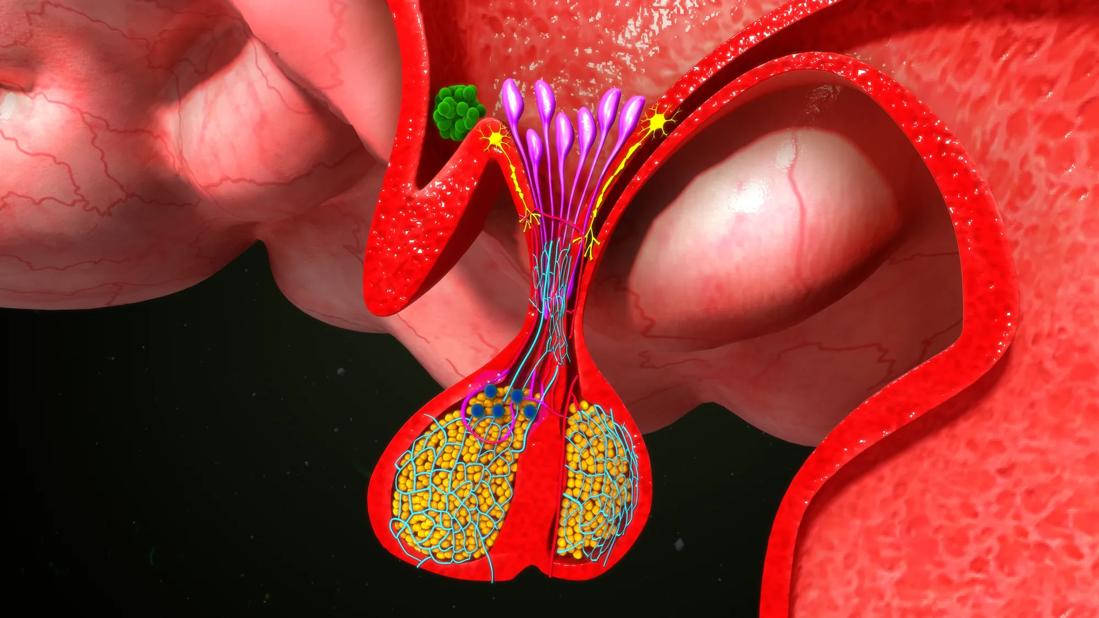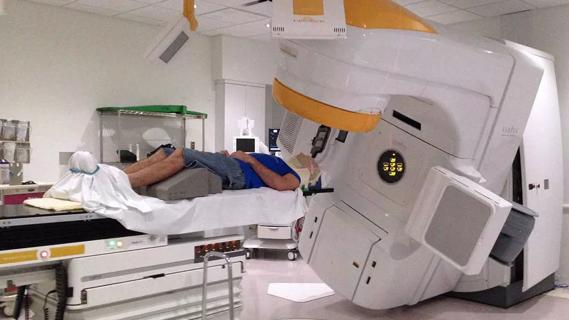Randomized controlled trial finds no quality-of-life benefit after standard pituitary tumor surgery

A week of prophylactic oral antibiotics taken after standard endoscopic transsphenoidal surgery for a pituitary tumor does not improve sinonasal quality of life compared with the standard 24 hours of postoperative oral antibiotics. So concludes a randomized controlled trial from researchers at Cleveland Clinic and two other U.S. centers that was recognized as the 2022 Top Paper of the Year by the Congress of Neurological Surgeons (CNS) at the 2022 CNS annual meeting this week. The study was published in the CNS journal Neurosurgery (2021;89[5]:769-776).
Advertisement
Cleveland Clinic is a non-profit academic medical center. Advertising on our site helps support our mission. We do not endorse non-Cleveland Clinic products or services. Policy
“This clinical trial, conducted at three major U.S. pituitary centers, indicates no advantage for extended use of postoperative oral antibiotics after standard transsphenoidal surgery,” says skull base neurosurgeon and study co-author Varun Kshettry, MD, who served as site principal investigator at Cleveland Clinic. “Our findings provide support for improving antibiotic stewardship without harming outcomes.”
Surgeons commonly prescribe postoperative oral antibiotics beyond routine perioperative antibiotic use following transsphenoidal surgery for pituitary lesions, although there are no evidence-based guidelines recommending this practice. Postoperative oral antibiotics are believed to promote healing and help prevent the common adverse effects resulting from nasal mucosa disruption, e.g., bacterial sinusitis, foul smell, nasal obstruction, drainage, crusting, septal perforation and polyps. However, evidence is lacking that this is the case.
In an effort to promote responsible antibiotic stewardship, the study authors sought to determine whether extended prophylactic oral antibiotics improve outcomes for standard transsphenoidal surgery for pituitary tumors.
The study was designed as a prospective, randomized, double-blind, placebo-controlled investigation conducted at Cleveland Clinic in Cleveland, Barrow Neurological Institute in Phoenix, and Thomas Jefferson University in Philadelphia. All participants received a single intraoperative and a single postoperative dose of an intravenous antibiotic. They were then randomized to receive either oral antibiotics or placebo for seven days after surgery. Antibiotics used were cefdinir or (for patients intolerant to cefdinir) trimethoprim-sulfamethoxazole. Patients were encouraged to use a saline nasal spray four times daily for the first postoperative week, then a sinus irrigation rinse twice daily through day 30.
Advertisement
Out of 461 patients screened between June 2016 and September 2019, 131 were randomized and 113 were analyzed (55 in placebo arm, 58 in antibiotic arm). All patients had a pituitary adenoma (i.e., nonfunctioning adenoma, acromegaly or prolactinoma) and planned binostril endoscopic transsphenoidal surgery. Exclusion criteria included Cushing’s disease, chronic or active sinusitis, prior sinus surgery and a planned nasoseptal flap procedure.
The two arms had well-matched baseline demographic characteristics, length of hospital stay and readmission rates.
Sinonasal quality of life was the study’s primary endpoint, in view of its importance to patients and clinicians. It was assessed using the following patient-reported tools:
Most patients in both arms had worse nasal scores at week 1, as expected shortly after surgery, but were back to preoperative baseline scores by week 8. The arms did not have clinically meaningful or statistically significant differences in scores using either assessment tool at any measured time point (P ≥ 0.24).
Other outcome measures were as follows:
Advertisement
No adverse effects associated with antibiotic use were noted.
Based on this trial, the authors conclude that postoperative oral antibiotic use beyond 24 hours following standard transsphenoidal pituitary surgery does not result in superior outcomes compared with no extended oral antibiotic use. They note that this finding is consistent with other clinical studies assessing antibiotic use for functional endoscopic sinus surgery for chronic rhinosinusitis.
“We have now changed our practice and no longer put patients on extended postoperative antibiotics,” notes co-author Raj Sindwani, MD, a rhinologic surgeon in Cleveland Clinic’s Head & Neck Institute. “This protects patients against side effects frequently associated with the use of antibiotics, such as gastrointestinal symptoms, as well as reducing costs.”
The authors caution, however, that their findings are not necessarily applicable to patients with Cushing’s disease, expanded endonasal skull base approaches or a planned nasoseptal flap procedure, as these groups were excluded from the trial because of greater likelihood of poorer healing. “Similarly designed investigations should be performed to evaluate the role of antibiotics in extensive endonasal surgery, such as expanded approaches and the use of a nasoseptal flap,” Dr. Sindwani says.
In addition to Drs. Kshettry and Sindwani, other Cleveland Clinic co-authors of the study were neurosurgeon Pablo Recinos, MD, Section Head of Skull Base Surgery, and Troy Woodard, MD, a surgeon in the Head & Neck Institute.
Advertisement
Advertisement

Reassessing antibiotic dosage and type and restoring gut biome could improve survival rates

Prompt, multidisciplinary care helps navigate the complexities of a rare condition

A range of pituitary tumor-related conditions all benefit from a multidisciplinary approach

Retrospective analysis assesses frequency and severity relative to a reference antibiotic

Up to 3 days faster than waiting for urine culture results

The tumor's proximity to critical structures made the case challenging

New research adds to understanding of an understudied link

Analysis examines surgical resection of rare pituitary tumors